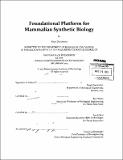Foundational platform for mammalian synthetic biology
Author(s)
Davidsohn, Noah (Noah Justin)
DownloadFull printable version (32.67Mb)
Other Contributors
Massachusetts Institute of Technology. Department of Biological Engineering.
Advisor
Ron Weiss and Jacob Beal.
Terms of use
Metadata
Show full item recordAbstract
The emergent field of synthetic biology is different from many other biological engineering efforts, in that its roots, design principles, and forward engineering perspective have been adopted from electrical engineering and computer science. Synthetic biology is uniquely poised to make great contributions to numerous fields such as bio-fuel, energy production, agriculture and eco-remediation, national defense, and biomedical and tissue engineering. Considerable progress has been made in engineering novel genetic circuits in many different organisms. However, not much progress has been made toward developing a formal methodology to engineer complex genetic systems in mammalian cells. One of the most promising areas of research is the study of embryonic and adult stem cells. Synthetic biology has the potential to greatly impact the progression and development of research in this area of study. A critical impediment to the development of stem cell engineering is the innate complexity, little to no characterization of parts, and limited compositional predictive capabilities. In this thesis, I discuss the strategies used for constructing and optimizing the performance of signaling pathways, the development of a large mammalian genetic part and circuit library, and the characterization and implementation of novel genetic parts and components aimed at developing a foundation for mammalian synthetic biology. I have designed and tested several orthogonal strategies aimed at cell-cell communication in mammalian cells. I have designed a characterization framework for the complete and proper characterization of genetic parts that allows for modular predictive composition of genetic circuits. With this characterization framework I have generated a small library of characterized parts and composite circuits that have well defined input-output relationships that can be used in novel genetic architectures. I also aided in the development of novel analysis and computational tools necessary for accurate predictive composition of these novel circuits. This work collectively provides a foundation for engineering complex intracellular transcriptional networks and intercellular signaling systems in mammalian cells.
Description
Thesis (Ph. D.)--Massachusetts Institute of Technology, Dept. of Biological Engineering, February 2013 Cataloged from PDF version of thesis. Includes bibliographical references (p. 116-129).
Date issued
2013Department
Massachusetts Institute of Technology. Department of Biological EngineeringPublisher
Massachusetts Institute of Technology
Keywords
Biological Engineering.